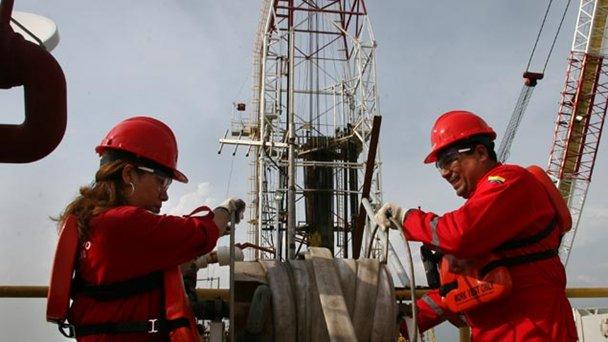
VENEZUELA: $90 UNCOMFORTABLE

Venezuela's embattled Nicolás Maduro has spent most of his 19-month presidency fighting to avoid changing any of the economic policies he inherited from his predecessor, the late Hugo Chávez. Maduro has repeatedly told his countrymen that Chávez's socialist blueprint is working in spite of mounting shortages, soaring inflation, and two maxi-devaluations in the past two years. Now falling oil prices may force his hand.
The price of Venezuela's benchmark basket of crude and petroleum products fell on Aug. 22 to $90.89, a two-year low. Since the end of last month, the price has fallen 10 percent, tracking a surprising drop in international prices in spite of Mideast tensions.
For Venezuela, each $1 drop in the per-barrel price translates into a $1 billion loss of government revenue. With a fiscal deficit already estimated at 14 percent to 15 percent of GDP, the fall in prices alarms many, especially as domestic oil production continues to slide.
"Maduro is very hesitant to do anything that has associated political costs, which is almost everything," says Risa Grais-Targow, an analyst with the Eurasia political risk consultancy in Washington, D.C. "But with Venezuela's oil price at $90 a barrel, the situation is already uncomfortable. If it falls further, it really becomes an issue."
Revenue from oil sales accounts for 96 percent of Venezuela's hard currency and nearly half of government revenue. Many economists forecast that oil prices will remain at current levels through the end of the year, a situation that won't give Maduro much comfort.
International reserves—which include a large position in gold—continue to dwindle. At the start of the year, they were the equivalent of about six months of imports; they now total three, says Cesar Aristimuño, an economist with Caracas-based Banca y Negocios. "The government has slashed imports to make sure they have funds to service their foreign debt," he says. Debt servicing, including the retirement of bonds coming due this year, is about $17.8 billion.
Cutting imports, though, has resulted in growing shortages of basic foodstuffs, including coffee, milk, and corn meal, as well as medicines, spare parts, toilet tissue, hand soap, detergents, and deodorants. International airlines are owed more than $3.5 billion in back remittances, and many have cut service to the country while waiting for the government to pay. Many plants and factories are idle; Venezuelan auto production has fallen more than 85 percent this year as such companies as Ford (F), Toyota (TM), and Chevrolet (GM) can't import needed parts.
Maduro has accused his critics of waging an "economic war" against him, hoping to shore up support. But even hard-core Chávistas aren't convinced. "How much further can we sink?" says Alicia Torres, a 53-year-old housewife in Caracas who voted for Maduro in special elections last year and now regrets her decision. "I spend hours in line each day, waiting for products to arrive. Maduro is killing the country with his ineptitude."
Support for Maduro, who styles himself as a "son of Chávez," has taken a hit. In a Consultores 21 poll released on Aug. 4, 67.8 percent of those surveyed said the country's situation is negative, with almost 63 percent blaming Maduro and his government.
Most economists believe that Maduro will eventually have to roll back many of Chávez's economic policies if the government is serious about reversing the decline. But changes to the Chávez economic policies—including another devaluation, raising taxes and the domestic price of gasoline, and ending subsidies—will certainly spur inflation and shortages, at least in the short term.
Maduro seems unwilling to risk it, especially as congressional elections approach (they're scheduled for next year). He has floated trial balloons, such as promising last month to raise the domestic gasoline price, which, at $0.01 a liter, is the cheapest in the world (the subsidy costs the government about $12 billion a year). The announcement was initially met by widespread support; some polls showed that 70 percent of those surveyed supported some increase. Yet subsequent reports of corruption within the government and continued oil giveaways to Cuba and other allies have eroded support for any price hike. Today, only 35 percent support the increase.
There has also been talk of changing the country's system of three official exchange rates and of raising prices of selected government services. "They're just trying to stay afloat, until next year's congressional elections," says Grais-Targow.
One step that Maduro seems willing to take is to ration food—a bid to end persistent shortages. At the end of the November, the government will introduce a system restricting the purchase of 23 essential items—including corn meal, rice, chicken, meat, and sugar—to guard against speculation and reduce long lines. Venezuelans will have to produce their ID card and be fingerprinted before making weekly purchases of goods.
The measure has already galvanized Venezuela's rift-ridden opposition, which has promised to take to the streets to protest the decision. Even Torres is aghast. "Rather than encouraging more production, they want to control what we buy," she says. "We've never had rationing before. Why don't they just realize that what we have isn't working?"
businessweek.com





